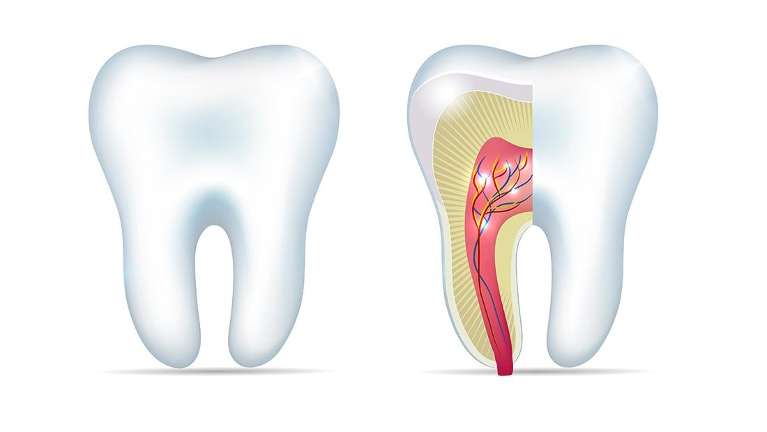
Infections are a fundamental challenge for all people on our planet. Though infectious agents cause many illnesses, their presence also worsens many non-infectious diseases. In fact, a National Institutes of Health (NIH) study showed a significant linkage between contagions in your mouth and teeth and other seemingly unrelated systemic diseases.
A few of the health conditions exacerbated by oral infections are:
- Cardiovascular disease
- Diabetes
- Some cancers
- Low birth weight
- Rheumatoid arthritis
What makes your body especially susceptible to germs in your mouth is what, traditionally, people consider your tooth’s most significant asset: its solidity. After all, tooth enamel is the hardest substance in your body, which is good at locking things out. But when a tooth is compromised, those infectious agents can literally be locked in.
The NIH researchers point out that “teeth are the only nonshedding surfaces in the body,” which means buildup cannot be excised in the same way as your skin, for example. Skin cells routinely flake off and carry bacteria away with them.
But an infection inside your tooth has a place it can hide and increase, with a direct path via your tooth root to your circulatory and nervous system. This is why treating an inner tooth infection is important as soon as possible.
At Causeway Dentistry, Dr. Earl Santos and his team can immediately address this condition with root canal therapy, also called a root canal for short. The signs you may need this treatment are clear. Here are five of the most prominent symptoms and how to interpret them.
#1 – Persistent and Painful Toothache
The number one reason people seek dental care that results in a root canal is incessant pain in their teeth, gums, or both that seems only to intensify. In most cases, the pain will accompany the other signs of a tooth infection, and its relentlessness relates to the structure of your inner tooth.
Beneath the curtain of tooth enamel is a softer layer called dentin, which surrounds a hollow containing your tooth pulp. This tissue nourishes your tooth, the blood vessels, and the nerves which connect it to your jaw. The narrow passages which provide this connection also contain the nerve. So, when bacteria and inflammation pressure the nerve, you feel pain. Likewise, as the infection grows, the pain increases with it.
#2 – Broken or Fractured Tooth
Along with a toothache, a crack, chip, or other fractures in the outer layer of your tooth is a strong sign you should seek dental care. It doesn’t matter if it happened in an accident, playing sports, or merely biting down on something tough; the outcome can be the same: bacteria can grow into the break, leading to swelling and deep tooth pain.
If you have even minor tooth damage, you should call our Clearwater dental office today so we can head off an otherwise potential tooth-threatening condition.
#3 – Achy, Swollen, or Sore Gums
Occasionally, bacteria may penetrate your inner tooth through your gum tissue rather than your tooth’s crown. When this happens, your gums will feel puffy and sore near the compromised tooth as the bacterial infection spreads in both areas.
Other gum issues that may indicate you need a root canal are:
- Bright red color instead of a healthy pink
- Gum tenderness
- A small bump-like sore or eruption on your gums (an abscess)
- A foul taste in your mouth from infectious fluid
- Bad breath
Because this symptom indicates a double threat to your tooth and gums, you should seek dental care without delay.
#4 – Temperature Sensitivity
While most people feel a twinge when eating a frozen treat, it should lead to blinding tooth pain. One early indication of an inflamed tooth nerve is a sensitivity to temperature stimulation as your nerve is already raw, so any additional stimulation pushes it over the edge.
The pain associated with this condition is usually sharp at first but persists as a dull soreness for a time. And like a toothache, this sensitivity will only increase over time if you need root canal therapy.
#5 – A Darkened or Black Tooth Spot
Among the only visual signs that you need a root canal is the translucent nature of tooth enamel and dentin. In both layers, what lies below can become more and more visible over time. For example, if you have an inner tooth infection, your tooth pulp begins to die and blacken. Where the bacteria have also compromised your dentin, this growing black spot may show up through your tooth enamel.
This condition is evident in your front-facing teeth but may also be observed in your molars. Any time you have tooth discoloration, primarily associated with a growing toothache, you should consult with your dentist right away.
Root Canal Treatment Near Me in Clearwater
If you ignore an inner tooth infection, the ultimate outcome may be more than just a lost tooth. Systemic health issues are only worsened by an established contagion hiding in the fortress that is your tooth.
Root canal therapy with Dr. Santos, your Clearwater dentist at Causeway Dentistry, can stop your painful tooth infection in its tracks and prevent it from returning. To learn more or to make an appointment, we encourage you to call our dental office today.
Related Services: Root Canal Treatment

